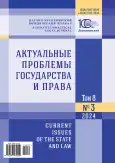On some features of the implementation of individual rights and freedoms in the digital space
- Authors: BELYANSKAYA O.V.1, CHOMAEV A.A.2
-
Affiliations:
- Sukharev Moscow Academy of the Investigative Committee of the Russian Federation
- North-Caucasus Federal University
- Issue: Vol 8, No 3 (2024)
- Pages: 339-348
- Section: General Theory and History of Law and the State
- URL: https://journal-vniispk.ru/2587-9340/article/view/303236
- ID: 303236
Cite item
Abstract
It is important to study the forms and procedures for implementing individual rights both in direct form and through law enforcement, taking into account modern needs and technologies that are changing the methods and means of their implementation. Analysis of the features of the implementation of individual rights in the digital space is of not only theoretical, but also practical interest, since the issue of the implementation of human rights is central to the general theory of law and industrial sciences. The study used scientific publications, regulatory legal acts, doctrinal documents of the President of the Russian Federation, as well as materials from Internet portals of public authorities. General philosophical theoretical methods of cognition and the formal legal method are used. The rights and freedoms implementation forms of the individual using digital technologies are based on the general mechanism of implementation of legal norms and include direct and law enforcement forms. The direct form is characteristic of private law relations. In the direct implementation forms of individual rights using digital technologies, digital literacy of the individual and the culture of behavior in the digital space become a necessary condition. The law enforcement form, taking into account the introduction of information technologies into the work of government bodies, has been significantly transformed and is most clearly manifested through the activities of providing public services to the population, in particular the Federal State Information System “Unified Portal of State and Municipal Services (Functions)”, State Automated System “Justice”, State Automated System “Elections”. These digital platforms make it possible to simplify the process of implementing public rights for citizens. A new approach to the problem of implementing the individual rights and freedoms is to determine the specifics of the main forms of implementation and the conditions under which they occur in the digital space. The author’s vision is presented regarding the possible development of legislation regulating the use of digital means. It is stated that the opinion regarding the need to limit the digital space as a platform for the implementation of human rights is archaic and this is primarily due to the desire of the individual to independently determine the framework for the implementation of his rights.
About the authors
Olga V. BELYANSKAYA
Sukharev Moscow Academy of the Investigative Committee of the Russian Federation
Author for correspondence.
Email: 520877@mail.ru
ORCID iD: 0000-0002-8936-2766
PhD (Law), Associate Professor, Senior Lecturer of Civil Law Disciplines Department
Russian Federation, 12 Vrubelya St., Moscow, 125080, Russian FederationAlbert A. CHOMAEV
North-Caucasus Federal University
Email: albert.chomaev@mail.ru
ORCID iD: 0000-0002-0528-1310
Senior Lecturer of Theory and History of State and Law Department
Russian Federation, 1 Pushkin St., Stavropol, 355017, Russian FederationReferences
- Sidorova A.P. (2020). The concept of digital space and its characteristics. Opportunities and threats of using digital space. Sbornik nauchnykh trudov po materialam 28 Mezhdunarodnoi nauchnoi konferentsii «Nauchnyi dialog: Molodoi uchenyi» = Collection of Scientific Works based on the Materials of the 28th International Scientific Conference “Scientific Dialogue: Young Scientist”. St. Peteraburg, Mezhdunarodnaya Ob”edinennaya Akademiya Nauk Publ., pp. 48-55. (In Russ.) https://doi.org/10.18411/spc-22-05-2020-11, https://elibrary.ru/pqculk
- El’temerov A.A., El’temerova O.V. (2021). Cultural behaviour in modern digital space. Kul’tura i bezopasnost’ = Culture and Security, no. 2, pp. 39-43. (In Russ.) https://doi.org/10.25257/KB.2021.2.39-43, https://elibrary.ru/wlllwx
- Klement’eva V.S., Voronina N.A. (2020). The right to access the Internet – a platform for the implementation of constitutional human rights and freedoms on the Internet. Vestnik Moskovskogo universiteta MVD Rossii = Vestnik of Moscow University of the Ministry of Internal Affairs of Russia, no. 8, pp. 51-53. (In Russ.) https://doi.org/10.24411/2073-0454-2020-10450, https://elibrary.ru/xuwfgo
- Belyanskaya O.V., Chomaev A.A. (2022). The process of law enforcement in the conditions of digitalization. Gumanitarnye i yuridicheskie issledovaniya = Humanities and Law Research, no. 9 (4), pp. 630-637. (In Russ.) https://doi.org/10.37493/2409-1030.2022.4.14, https://elibrary.ru/csnhmw
- Belyanskaya O.V. (2008). Essence end basic forms to realization of the law, rights and liberties to personality. Pravovaya politika i pravovaya zhizn’, no. 3, pp. 116-122. (In Russ.) https://elibrary.ru/juywxl
- Uzdimaeva N.I. (2021). Innovative mechanisms for realizing the right to self-defense in the conditions of digitalizing the right: current status and prospects. Yuridicheskaya tekhnika = Juridical Techniques, no. 15, pp. 463-469. (In Russ.) https://elibrary.ru/sigkje
- Bannikova O.M. (2023). The role of digitalization in the protection of human and civil rights on the example of the institution of the commissioner for human rights in the Russian Federation. Teoriya gosudarstva i prava = Theory of State and Law, no. 4-1 (34), pp. 13-16. (In Russ.) https://doi.org/10.47905/MATGIP.2023.4_1_34_13, https://elibrary.ru/dodrxs
- Shelomentsev V.N. (2012). The legal status of public associations in the Russian Federation. Nauchnyi vestnik Moskovskogo gosudarstvennogo tekhnicheskogo universiteta grazhdanskoi aviatsii = Civil Aviation High Technologies, no. 182, pp. 114-123. (In Russ.) https://elibrary.ru/pvujhh
- Belyanskaya O.V., Chomaev A.A. (2022). The impact of digitalization on the process of legal activity. Aktual’nye problemy gosudarstva i prava = Current Issues of the State and Law, vol. 6, no. 4, pp. 488-495. (In Russ.) https://doi.org/10.20310/2587-9340-2022-6-4-488-495, https://elibrary.ru/qkiymw
- Chomaev A.A. (2023). On some problems of using digital technologies in the process of realizing individual rights and freedoms. Gumanitarnye i yuridicheskie issledovaniya = Humanities and Law Research, no. 10 (2), pp. 314-320. (In Russ.) https://doi.org/10.37493/2409-1030.2023.2.18, https://elibrary.ru/oecbav
Supplementary files








